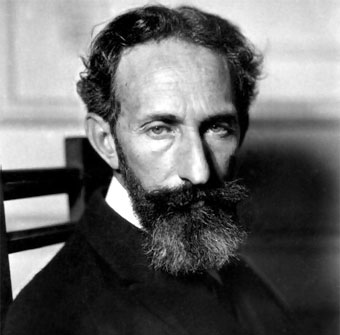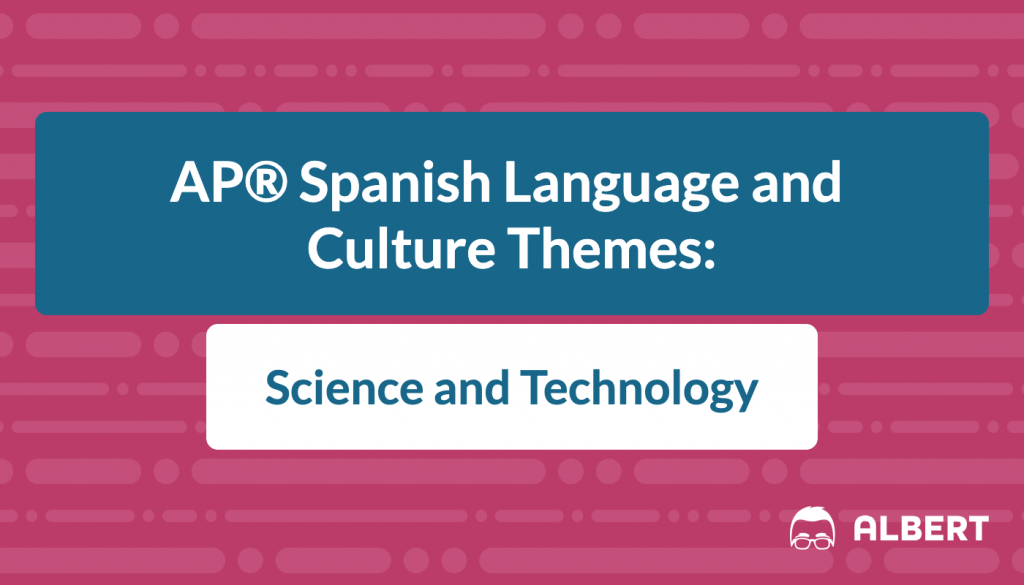Introduction
This comprehensive AP® Spanish Language and Culture review will help test-takers learn about one of the AP® Spanish themes of the CollegeBoard’s Spanish Language & Culture curriculum – in particular, about the theme of Science and Technology. Specifically, we will discuss why the CollegeBoard uses themes for their AP® Spanish Language and Culture course; what the theme of Science and Technology actually entails, as well as provide specific context examples of how this theme may be applied in a class or study session.
We will also review some overarching, essential questions regarding Science and Technology to assist you in your understanding of the topic, as well as offer examples on how to answer them. Finally, this guide will deliver information on where you can find practice texts, audios, videos and other study tools related to Science and Technology, as well as review top 10 Spanish vocabulary words related to Science and Technology and how to use them in a sentence.
Why does the CollegeBoard use Themes for their AP® Spanish Language and Culture Course?
The AP® Spanish Language and Culture class is designed around six AP® Spanish themes of historical and contemporary bearing: Global Challenges, Science and Technology, Contemporary Life, Personal and Public Identities, Families and Communities, and Beauty and Aesthetics. These subjects are used to produce inspiring lesson plans for you to learn the diversity of language and culture of the Spanish speaking world. Short hour long lessons, or units lasting several weeks, days, or months, prepare those taking the AP® Spanish Language and Culture exam in May.
As such, by the end of the course, you should be able to implement knowledge of these themes into written and oral interpersonal and presentational communication forms to help you earn a top score!
What does the Theme of Science and Technology Entail?
The AP® Spanish Language and Culture theme of Science and Technology may incorporate lessons on –access to technology; effects of technology on self and society; health care and medicine; natural phenomena; and science and ethics. Teachers and students may engage in class discussions and projects that focus on the history of medical developments in Cuba; the impact of climate change in the Caribbean; or access to and effects of Smart Phone use in Spanish-speaking communities. You may be asked to discuss the social effects of new communication technologies based on existing news sources in Latin American, the Caribbean, or Spain.
What are Science and Technology Overarching, Essential Questions?
One way that AP® Spanish teachers can design curriculum around course themes is to consider overarching essential questions that will serve to inspire learners and motivate them to deeper investigation. Such questions should seek to engage students in real-life, problem solving tasks that allow them to express different views on real world issues, make connections to other course subjects, while enabling them to compare and contrast aspects of the language, literature, and cultures of the Spanish-speaking world to their own.
Essential questions geared toward a better understanding of Science and Technology may include:
- How do developments in science and technology affect our lives?
- What factors have driven innovation and discovery in the fields of science and technology?
- What role do ethics play in scientific advancement?
Example Answers to 2-3 Overarching, Essential Questions
Below are examples of how you may answer the essential questions you’ll encounter in yourAP® Spanish Language and Culture course.
What factors have driven innovation and discovery in the fields of science and technology?
Progress in science and technology drive the evolution of our species in both beneficial calamitous ways. New capabilities that emerge from ever evolving science and tech fields can change what various sectors are doing or want to do—sometimes dramatically—and thus unswervingly affect public, private, and academic arenas.
New technologies and products are introduced to the market at a rapid rate. Speedy hi-tech innovation, extreme competition, and the formation of new niche markets are predicted to continue or increase in the coming years. But what factors drive these innovations and discoveries? What advances the field of science and technology?
For starters, scientific and technological advances are more than a redress to what the market desires. Many chemists, engineers, mathematicians, technicians, and academics alike believe the greatest factors driving discovery in science and technology comes from natural, human curiosity about the world and how it works.
Curiosity driven research, and the advances that such work brings to life, have a significant impact on personal and global interests. It inspires individuals and countries to contribute to new industries that impact health, welfare, comfort, communication, and national security.
What role do ethics play in scientific advancement?
The work scientists put forth into the world often shapes public policy. In light of this, the question remains—should scientists’ ideological beliefs impact their work or make them advocates for particular state and federal policy measures? Should their role as a citizen trump their role as an impartial, objective scientist? Further, should the ideological values of research institutions and their benefactors’ impact results? When science, politics, finance, and belief overlap, innovators, knowledge workers, and the margins they occupy are often muddled.
The disputes over stem cells and embryo research, for example, have become a contested political issue concerning scientists, policy makers, politicians and religious groups. Likewise, the debates on genetically modified organisms (GMOs) have brought civil society, scientists, and policy makers together over wide arguments on ethics and food and drug safety. Regulations on genome-editing technologies have spurred concern over how the social acceptance of marketable products cannot go undebated or unregulated. Transparency is central to an informed public to be able to make decisions on the various paths our society may take.
As such, scientific research necessitates comprehensive ethical reflection. The only way to ensure such reflection on the cultural, legal, and ethical diversity of innovation occurs is by supplying both the scientific community and the public with easy access to up-to-date information, controversies, and facts. As a means of checks and balances, greater democratic debate on science, tech, and ethical issues should be promoted so that a diverse spectrum of ideas can generate sound and reasoned policies relevant to sustaining a healthy global environment.
Where can you Find Practice Texts, Audios, and Videos Related to Science and Technology?
In this section, you’ll find a few suggestions on AP® Spanish Language and Culture practice texts, audios, and videos that will bring you specific content knowledge related to the AP® Spanish theme of Science and Technology.
For a General Overview of AP® Spanish Language and Culture Themes
First, for a general overview of all six AP® Spanish themes, check out the AP® Spanish Language and Culture homepage. Here AP® students and test takers can access official CollegeBoard information published on their course. There are examples syllabi available, course milestones and objectives to follow, and other useful material to assist both teachers and learners in mastering AP® Spanish. Textbooks are also available to help students strengthen their skills. For a book focused particularly on the six themes, get a hold of: Temas: AP® Spanish Language and Culture from Amazon or your local library or book seller.
Run by Instituto Cervantes and the Ministry of Education, Culture and Sport of Spain, DELE (Diploma de Espanol como Lengua Extranjera) is comparable to the AP® Spanish Language and Culture exam in that it confirms test takers capability and mastery of Spanish. Their website offers practice exams based on oral and written expression and interaction.
Quizlet is a fun online tool to create “index cards” with key terms and definitions relative to any of the six AP® Spanish themes. These can then be turned into review items in the form of games or practice tests. Click here for flashcards on Science and Technology.
Another entertaining online tool for AP® students and teachers to draw ideas from is Audiria. Their site offers entertaining podcasts and videos in Spanish that are centered on various cultural and thematic issues.
For More Intensive Practice with the Theme of Science and Technology.

Horacio Quiroga (1878-1937) was a Uruguayan playwright, poet, and short story writer best known for his genre work in science fiction, the supernatural, and the paranormal. His stories are primarily set within a jungle, and use bizarre scenarios to explore the survival of man and animal in nature. His books are believed to have influenced authors like Gabriel García Márquez, Julio Cortázar, along with other Latin American magic realist and surrealist writers and artists. Check out his collected works for an overview of his oeuvre.
For those looking for more hard based facts and evidence, the following page offers the latest research trends in Latin America concerning science, medicine, technology, and scientific publications produced in various countries throughout the region.
For cine files, IMDB offers a compelling list of Spanish language science fiction films that could keep you binge watching, while practicing your vocabulary, for a long while. Particularly notable films include Abrelos Ojos (Spain), Moebius (Argentina), andLos Cronocrímenes (Spain).
Top 10 Spanish Vocabulary Words for Science and Technology
Here is a list of frequently used AP® Spanish vocabulary words related to the theme of Science and Technology.
Unexpected: Inesperado
El partido terminó con un resultado inesperado.
To secure: Asegurar
La madre aseguró el cuadro en la pared.
Growing: Creciente
El creciente uso de los Smart Phoneshan facilitado la comunicación global.
Improvement: Mejoramiento
Favorablemente, el paciente está empezando a mostrar señales de mejoramiento.
To attempt: Pretende
Qué resultados pretendes encontrar con esta investigación?
Heated: Acalorado
La maestra y los estudiantes tuvieron una discusión acalorada por su oposición de opiniones.
Regenerate: Regenerar
Juntos podremos ganar mucho más para regenerar nuestro planeta en vías de extinción.
Quality: Calidad
Este museo organiza frecuentemente exposiciones temporales de gran calidad.
To assume: Asumir
El doctor asumió responsabilidad en el caso de negligencia.
Availability: Disponibilidad
Queremos contratar una persona con la disponibilidad de trabajar a tiempo completo.
Looking for AP® Spanish Language practice?
Kickstart your AP® Spanish Language prep with Albert. Start your AP® exam prep today.








